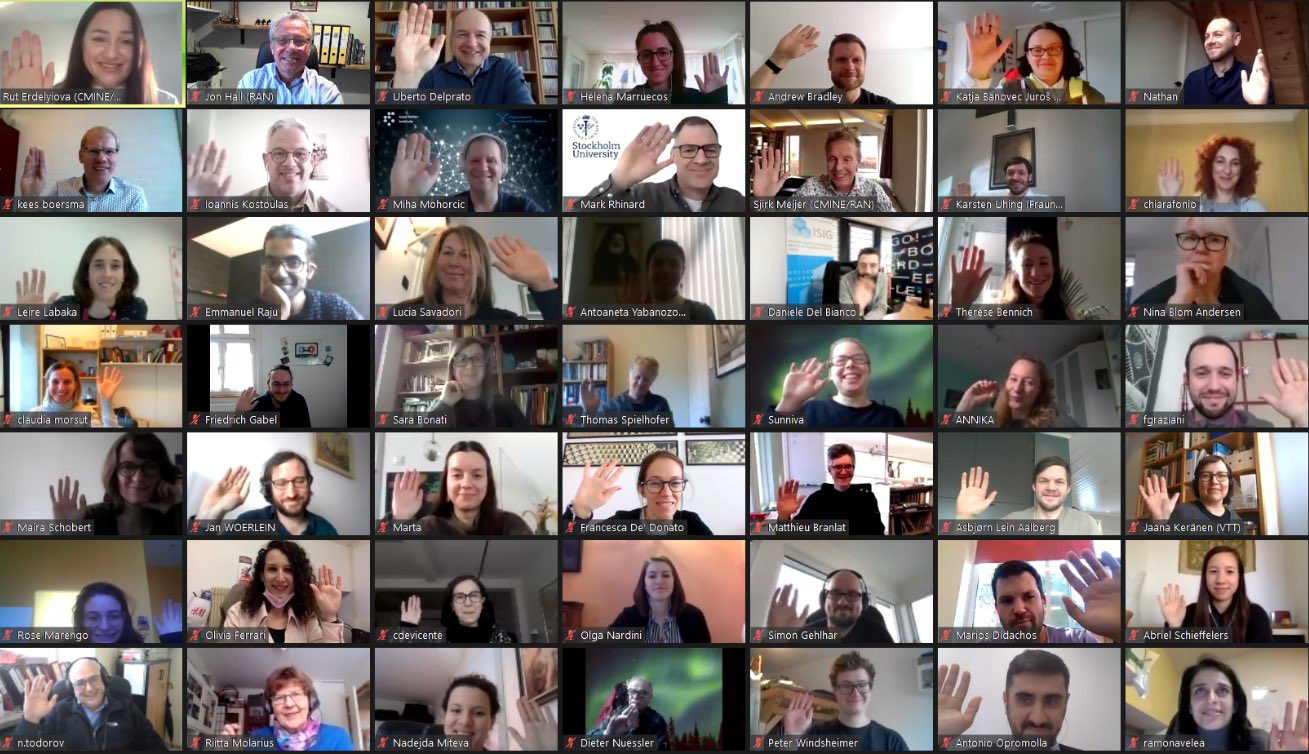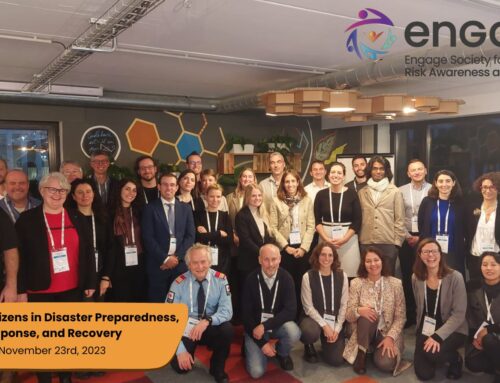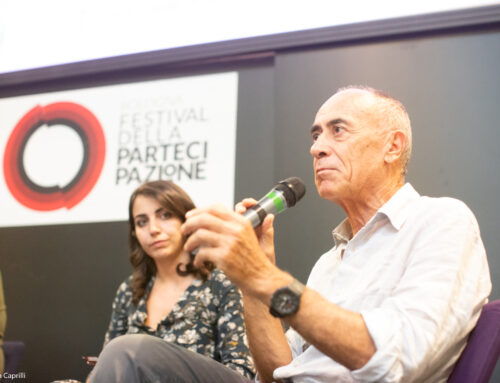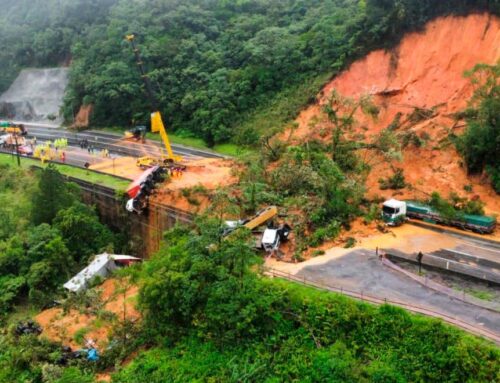The Horizon 2020 programme priorities reflected on prime societal challenges faced by the global community. Securing itself against, and being prepared for, disasters is one of the central elements of the functioning of any society. There are hardly any societal functions which are not to some extent exposed to natural or man-made disasters and related resilience and security issues.
The resilience of societies heavily depends on how their citizens behave individually or collectively, and how governments and civil society organisations design and implement policies for mitigating risks, preparing for, reacting to, overcoming, and learning from disasters. The spread of new technologies and media are inducing dramatic changes in how individuals and communities behave, and they are affecting societies in unpredictable ways. Building the resilience of society and citizens requires a better understanding and implementation of these new technologies, media and tools, and their capacity to raise disaster risk awareness, to improve citizen understanding of risks, to build a culture of risks in society, to enable an effective response from affected populations, to improve functional organisation in most fragile and vulnerable environments, and to increase the resilience of health services, social services, education, and governance, in line with target (d) of the Sendai Framework on critical infrastructure and disruption of basic services.
The Horizon 2020 Framework programme‘ enabled through it’s Work programme „Secure societies“ and specifically the DRS01 call focused on “Human factors and social, societal and organizational aspects for disaster-resilient societies” research teams to address related research and innovation issues and work towards a consolidated common European understanding of disaster resilience and empower disaster-resilient societies that cope with disasters and build back better.
The Horizon 2020 DRS01 Cluster
The Horizon 2020 DRS01 Cluster was established in September 2020 with the endorsement of the Research Executive Agency REA to enable the DRS01 projects RESILOC, BUILDERS, ENGAGE and LINKS funded under the action to cooperate, collaborate and coordinate, in order to support and enhance synergies across their strategic objectives and jointly contribute to the build up to the ultimate goals of the Framework programme. The project teams started supporting each other in challenges related to visibility & dissemination, research ethics, terminology, gradually expanding cooperation to other areas of their projects actions boosting theri capacity to address the complexities of societal resilience.
In order to facilitate interaction, a dedicated DRS01 Cluster group was established on the Crisis Management Innovation Network Europe CMINE enabling the projects to share information, experiences, best practice and lessons learned but also convene and conference at any point of need in a secure but dynamic online environment of the platform www.cmine.eu. The DRS01 Cluster is pioneering cooperation schemes paving the way for added value interactions of the projects to deliver upon the diverse strategic objectives with the support of the recently launched Horizon Europe programme.
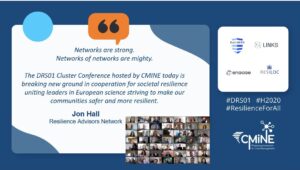
The focus and priorities addressed within the DRS01 Cluster evolve from challenges addressed by the involved projects.
RESILOC Project
The RESILOC project seeks to offer diverse users & authorities in local communities a strategic tool for assessing resilience, enabling all to identify actions that can increase it. With the RESILOC toolkit, local communities will be able to assess their resilience by studying challenges, comparing strategies, actions and their impact. The DRS01 Cluster cooperations enables us to adress the resilience of European societies through composite perspectives.
“The RESILOC team now further explores opportunities to build up on synergies with the Horizon 2020 DRS01 Cluster projects BUILDERS, LINKS and ENGAGE to contribute together to more effectively captured baselines and addressed complexities of societal resilience. We greatly benefit from the discussions of challenges in research data management, ethical aspects of research & methodological and policy dimensions.” Uberto Delprato, Scientific Coordinator of RESILOC
BUILDERS Project
The BUILDERS project works on increasing the societal resilience and social capital of European communities and citizens. It will do this by genuinely co-designing processes and tools with citizens, first-responder organizations and technology tools developers. One of our main objectives is to provide policy recommendations to the relevant stakeholders to maximize the usability and reliability of social media in disasters and recovery processes.
‘’Among BuildERS objectives is to understand how the most vulnerable segments of the society perceive risks, prepare and behave in case of a crisis’’.
ENGAGE Project
The ENGAGE project aims to engage societies in risk awareness to enhance their most powerful resource: societal resilience. ENGAGE seeks to link the informal resilience naturally inherent in citizens with the formal work of authorities to adapt before, during and after a disaster. The project will do this by providing impactful solutions and emergency response guildelines to bridge existing gaps. The DRS01 Cluster allows researchers, practitioners and national experts to learn from each other and exchange best practices.
“When it comes to disaster management, we tend to think about the efforts of public authorities to protect citizens and not about the impactful contribution that citizens can make to societal safety and security. DRS01 cluster brings together bold projects that aim to make better use of Europe’s societal resilience” Alexis Gizikis, ENGAGE Dissemination Manager.
LINKS Project
The LINKS project intends to produce a sustainable advanced learning on the use of social media and crowdsourcing in disasters. It starts with an assessment of the three complementary knowledge domains (Disaster Risk Perception and Vulnerability, Disaster Management Processes, and Disaster Community Technologies) and will develop the LINKS Framework, which consists of scientific methods, practical tools, and guidelines to understand, measure and govern SMCS for disasters. This will also be evaluated through five practitioner-driven European cases. Furthermore, LINKS sets out to create the LINKS Community, which brings together a wide variety of stakeholders, both online and in person.
“The LINKS Consortium is looking forward to working together with the RESILOC, BUILDERS, and ENGAGE projects, in particular by organising joint initiatives aiming at sharing the outcomes of the projects and pooling forces to create new knowledge on specific aspect of common interest, such as research ethics, policy recommendations for disaster resilience, and data sharing among projects” Nathan Clark, Scientific Coordinator of LINKS.
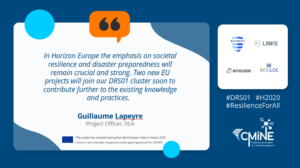
“Building future resilience to global threats today empowers us to generate change for a safer tomorrow. Cooperation within the Horizon 2020 DRS01 Cluster enables us to uniquely embrace our shared responsibility to contribute to resilience for all.” Rut Erdelyi, DRS01 Cluster Coordinator at www.cmine.eu

